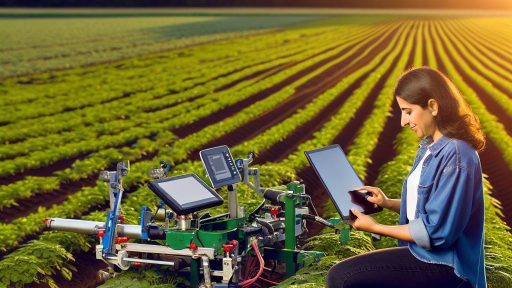Introduction to Blockchain Technology in Agriculture
Blockchain technology transforms various industries globally, including agriculture.
This technology enhances transparency, efficiency, and trust in agricultural transactions.
Farmers, suppliers, and consumers benefit from secure payment methods based on blockchain.
Understanding Blockchain Basics
Blockchain serves as a decentralized digital ledger for recording transactions.
This ledger is immutable, meaning once information is recorded, it cannot be altered.
Each block in the chain contains details of transactions and a unique identifier.
This structure ensures that all participants can verify the data independently.
The Role of Smart Contracts
Smart contracts automate processes without the need for intermediaries.
These contracts execute predefined actions when conditions are met, increasing efficiency.
Agricultural payments can be executed instantly based on contract terms.
This reduces delays and provides farmers with quick access to funds.
Enhancing Transparency and Trust
Blockchain’s transparent nature allows all stakeholders to view transaction records.
This visibility increases trust among all parties involved in the agricultural supply chain.
Consumers can verify the origin and quality of their food products easily.
As a result, trust in food safety issues improves significantly.
Transform Your Agribusiness
Unlock your farm's potential with expert advice tailored to your needs. Get actionable steps that drive real results.
Get StartedCase Studies and Real-World Applications
A number of companies are already utilizing blockchain in agriculture.
One example is AgFunder, which invests in food and agricultural technology.
Another example is IBM Food Trust, which enhances traceability in the food supply chain.
These initiatives showcase the potential of blockchain to revolutionize agricultural payments.
Current Challenges in Agricultural Payment Systems
Lack of Transparency
Agricultural payment systems often lack transparency.
Farmers struggle to understand transaction details.
This opacity can lead to mistrust between parties.
Moreover, hidden fees diminish farmers’ earnings.
High Transaction Costs
Traditional payment methods incur high transaction fees.
These costs significantly impact farmers’ profits.
In addition, small-scale farmers feel these financial burdens acutely.
Slow Transaction Times
Traditional payment systems often process transactions slowly.
Delays can hinder farmers’ ability to make timely purchases.
Consequently, this can affect overall productivity.
Fraud and Security Issues
Fraud poses a major risk in agricultural payment systems.
Incidents of scams lead to financial losses for farmers.
Additionally, security breaches can compromise sensitive data.
Limited Access to Financial Services
Many farmers lack access to reliable financial services.
This limitation restricts their ability to participate in markets.
Furthermore, rural areas often have fewer banking options.
Inconsistent Payment Methods
Farmers often deal with inconsistent payment methods.
This inconsistency complicates financial planning for them.
Furthermore, varied systems create confusion and inefficiencies.
How Blockchain Can Enhance Transparency in Transactions
Understanding Blockchain Technology
Blockchain technology serves as a distributed ledger system.
Showcase Your Farming Business
Publish your professional farming services profile on our blog for a one-time fee of $200 and reach a dedicated audience of farmers and agribusiness owners.
Publish Your ProfileThis system records transactions across multiple computers.
It ensures that no single entity controls the entire ledger.
As a result, transparency is fundamental to its operation.
Benefits of Enhanced Transparency
Transparent transactions build trust among parties involved.
Farmers can verify payment information more easily.
Moreover, buyers can trace the source of their produce.
This traceability minimizes fraudulent activities.
Consequently, everyone experiences increased confidence in transactions.
Improving Accountability in Agricultural Payments
Blockchain creates an immutable record of all transactions.
This feature holds all parties accountable for their actions.
Thus, disputes can be resolved with accurate transaction histories.
Farmers and suppliers can address concerns promptly.
Implementing Smart Contracts
Smart contracts automate and enforce agreements between parties.
They execute transactions once predetermined conditions are met.
This process reduces delays and ensures timely payments.
Additionally, it cuts down on administrative costs associated with traditional processing.
Case Studies in the Agricultural Sector
Several organizations already utilize blockchain for agricultural payments.
Farmers in Kenya benefit from a blockchain-based system.
This system enables them to receive instant payments for their products.
Similarly, in the U.S., a network of suppliers now tracks produce with blockchain.
This tracking enhances food safety and quality assurance.
Challenges to Overcome
Despite its advantages, blockchain faces various challenges.
First, scalability is a concern for many networks.
Additionally, educational barriers exist for smaller farmers.
These farmers may struggle to adapt to new technologies.
Moreover, regulatory frameworks are not yet fully supportive.
Future Prospects of Blockchain in Agriculture
Blockchain technology can significantly reshape agricultural payments.
As awareness increases, more stakeholders may adopt this solution.
Ultimately, this shift could lead to a more transparent agricultural ecosystem.
In turn, enhanced transparency will bolster the sector’s overall trustworthiness.
Explore Further: Sustainable Agriculture Through Biotechnology Innovations
The Role of Smart Contracts in Agricultural Payments
Introduction to Smart Contracts
Smart contracts automate transactions using blockchain technology.
They execute predefined terms automatically when conditions are met.
This feature enhances trust between parties in agriculture.
Additionally, smart contracts reduce the need for intermediaries.
Consequently, this lowers transaction costs for farmers and buyers.
Benefits of Smart Contracts in Agriculture
Smart contracts increase efficiency in agricultural payments.
They ensure timely payments once delivery is confirmed.
This immediacy encourages quicker sales processes.
Moreover, transparency is a key benefit of using smart contracts.
Showcase Your Farming Business
Publish your professional farming services profile on our blog for a one-time fee of $200 and reach a dedicated audience of farmers and agribusiness owners.
Publish Your ProfileAll parties can view transactions on the blockchain ledger.
Challenges of Implementing Smart Contracts
Implementing smart contracts poses certain challenges.
One challenge is the need for technical knowledge among users.
Farmers and buyers may require training to use this technology.
Additionally, legal recognition of smart contracts varies globally.
This inconsistency can hinder widespread adoption.
Successful Case Studies
Several companies have successfully integrated smart contracts in agriculture.
For instance, AgUnity helps farmers in developing countries.
They use smart contracts to facilitate fair trade practices.
Furthermore, IBM’s Food Trust also employs smart contracts.
This initiative enhances the supply chain’s transparency and efficiency.
The Future of Smart Contracts in Agricultural Payments
The future looks promising for smart contracts in agriculture.
As technology advances, more farmers will adopt these systems.
Increased adoption can lead to more efficient supply chains.
Moreover, smart contracts can foster better relationships between producers and consumers.
This development may ultimately strengthen the agricultural economy.
Find Out More: Benefits Of Using Farm Management Software On Modern Farms
Benefits of Using Blockchain for Farmers and Suppliers
Enhanced Transparency
Blockchain technology provides a transparent ledger for all transactions.
This visibility helps farmers track their products from seed to sale.
Moreover, it allows consumers to verify the origin of their food.
As a result, stakeholders can build trust throughout the supply chain.
Faster Payments
Blockchain enables real-time processing of payments.
This speeds up the transaction cycle for farmers and suppliers.
Consequently, they receive their money much faster than traditional methods.
Faster payments improve cash flow, benefiting the entire industry.
Reduced Transaction Costs
By cutting out intermediaries, blockchain lowers transaction fees.
This reduction allows farmers to retain more of their profits.
In turn, suppliers can offer competitive pricing, benefiting all parties.
Additionally, cost savings can be reinvested into better farming practices.
Improved Data Security
Blockchain technology enhances security through encryption.
This protection minimizes the risk of fraud and data breaches.
Farmers can confidently share data without fearing unauthorized access.
Hence, they can focus on production rather than security concerns.
Smart Contracts
Smart contracts automate transactions based on pre-defined conditions.
These contracts execute automatically when conditions are met.
This automation reduces human error and increases efficiency.
As a result, farming operations can run more smoothly and predictably.
Uncover the Details: Using Drones To Optimize Farm Productivity

Case Studies: Successful Implementation of Blockchain in Agriculture
Example of Proven Results
Farmers in Kenya have embraced blockchain technology.
This initiative simplifies the payment process for agricultural products.
Showcase Your Farming Business
Publish your professional farming services profile on our blog for a one-time fee of $200 and reach a dedicated audience of farmers and agribusiness owners.
Publish Your ProfileThey utilize smart contracts for immediate payment upon delivery.
This innovation enhances transparency and trust among stakeholders.
International Success Stories
Argentina showcases the effectiveness of blockchain in agriculture.
A local company, AgroToken, uses blockchain for grain tracking.
Farmers receive tokens representing their grain supply.
This allows for easier trading and market access.
Consequently, profits increase for participating farmers.
Regional Cooperative Experience
A cooperative in Spain has implemented blockchain for olive oil production.
The system records every step from harvest to shelf.
Consumers can verify the authenticity of their products.
This approach boosts consumer confidence and loyalty.
Challenges and Solutions
Adopting blockchain presents challenges for many farmers.
Education and training are vital for successful implementation.
Several organizations offer resources to facilitate the transition.
Support from local governments also plays a significant role.
Overcoming these hurdles leads to sustainable practices in agriculture.
Future Prospects
The future of blockchain in agriculture looks promising.
More farmers are recognizing its benefits worldwide.
Continued development can enhance supply chain efficiency.
This evolution may lead to greater food security globally.
Delve into the Subject: Blockchain For Ethical Sourcing In Agricultural Supply Chains
Challenges and Limitations of Blockchain Adoption in the Agricultural Sector
Technical Complexity
Blockchain technology is inherently complex to implement.
This complexity can deter farmers from embracing it.
Many agricultural stakeholders lack technical expertise.
Transitioning from traditional systems to blockchain presents challenges.
Consequently, a steep learning curve exists for users.
Regulatory and Legal Hurdles
Regulatory frameworks for blockchain are still developing.
Inconsistencies across regions create uncertainty for farmers.
Legal recognition of blockchain transactions remains a challenge.
This uncertainty may hinder widespread adoption in agriculture.
Infrastructure Limitations
Many rural areas lack the necessary digital infrastructure.
Weak internet connectivity limits access to blockchain solutions.
Moreover, inadequate hardware can prevent effective usage.
Investment in infrastructure is crucial for success.
Cost Implications
Implementing blockchain can be costly for farmers.
High initial investment may be a significant barrier.
Additionally, ongoing maintenance costs pose challenges.
Farmers often prioritize immediate expenses over technology.
Data Privacy Concerns
Storing sensitive agricultural data on a public blockchain raises concerns.
Farmers may fear losing control over proprietary information.
Showcase Your Farming Business
Publish your professional farming services profile on our blog for a one-time fee of $200 and reach a dedicated audience of farmers and agribusiness owners.
Publish Your ProfileEstablishing robust privacy protocols is essential for trust.
Interoperability Issues
Different blockchain platforms may not seamlessly integrate.
This lack of interoperability can limit the technology’s effectiveness.
Standardization across platforms is necessary for broader adoption.
Resistance to Change
Many stakeholders are resistant to changing established systems.
Traditional methods have proven reliable for years.
This resistance can slow down the adoption of innovative solutions.
Education and outreach are vital to overcome this barrier.
Future Trends: The Evolution of Payment Systems in Agriculture with Blockchain
Blockchain’s Impact on Agricultural Payments
Blockchain technology is revolutionizing agricultural payments.
It enhances transparency and security in transactions.
Farmers can receive payments directly, reducing intermediaries.
This shift leads to faster payment processing times.
Moreover, it minimizes the risk of fraud significantly.
Integration of Smart Contracts
Smart contracts are automating payment processes in agriculture.
These contracts execute automatically when conditions are met.
As a result, farmers see timely payments for delivered goods.
This technology fosters trust between buyers and sellers.
It also reduces operational overhead costs for everyone involved.
Enhancing Financial Inclusion
Blockchain promotes financial inclusion for smallholder farmers.
Many of these farmers lack access to traditional banking systems.
Blockchain offers them new avenues to receive payments.
As a result, they can engage more actively in the market.
This inclusivity leads to improved livelihoods and economic growth.
Data Management and Traceability
Blockchain allows for better data management in agriculture.
It provides an immutable record of transactions.
This data facilitates traceability from farm to fork.
Consumers increasingly demand transparency about food origins.
With blockchain, farmers can deliver proof of authenticity.
Regulatory Considerations
The integration of blockchain in agriculture requires regulatory support.
Governments must adapt existing frameworks to accommodate this technology.
Supportive regulations can drive adoption across the farming sector.
Furthermore, it can help standardize practices to enhance security.
As a result, all stakeholders will benefit equally from advancements.
Additional Resources
E-agriculture in action: Blockchain for agriculture
How Blockchain Technology is Transforming the Agricultural …




